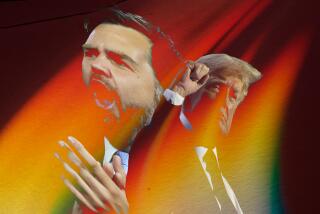Exceptionalism and the left
- Share via
Is America “exceptional”?
All countries are different, but does America differ from all of them, in a fundamental way? Does it have a special purpose or destiny in the world?
That’s becoming the battle cry of the Republican Party in its bid to unseat President Obama in 2012. Sarah Palin, Mitt Romney, Newt Gingrich, Mike Huckabee and other GOP presidential hopefuls have all declared Obama insufficiently attuned to American exceptionalism. America is exceptional, they say, except our own president doesn’t appreciate it.
“His worldview is dramatically different from any president, Republican or Democrat, we’ve had,” charged Huckabee. “To deny American exceptionalism is in essence to deny the heart and soul of this nation.”
The charge puts Obama and the Democrats in a difficult spot. According to a recent poll, 58% of Americans agree with the statement, “God has granted America a special role in human history.”
Whether we’re exceptional or not, then, most of us believe we are. And it would be political suicide for Obama — or anyone else — to suggest otherwise.
Instead, the president should invoke America’s long tradition of left-wing exceptionalism. The great warriors for social justice in our history all insisted that America had a providential destiny. Unlike present-day conservatives, however, they also indicted the nation for abandoning this mission. They used American exceptionalism to critique America’s vices, not just to sing its virtues.
Consider the abolitionist movement of the 19th century, which routinely invoked the nation’s divine purpose and its founding documents to condemn slavery. In the first editorial of his magazine, the Liberator, William Lloyd Garrison quoted the Declaration of Independence: “Assenting to the ‘self-evident truth … that all men are created equal, and endowed by their Creator with certain unalienable rights — among which are life, liberty, and the pursuit of happiness,’ I shall strenuously contend for the immediate enfranchisement of our slave population,” Garrison wrote. “I will not equivocate — I will not excuse — I will not retreat a single inch — AND I WILL BE HEARD.”
He was. So was the great African American abolitionist Frederick Douglass, whose famous Fourth of July address in 1852 cited the same document. “The Declaration of Independence is the ring-bolt to the chain of your nation’s destiny,” Douglass intoned. “The principles contained in that instrument are saving principles. Stand by those principles, be true to them on all occasions, in all places, against all foes, at whatever cost.”
But by enslaving black Americans, the nation contradicted this core doctrine. It also violated the Constitution, Douglass insisted. “Interpreted as it ought to be interpreted, the Constitution is a glorious liberty document,” he argued. “Read its preamble; consider its purposes. Is slavery among them?”
True, Douglass admitted, the Constitution did say that “those bound to service for a term of years” would be counted as “three-fifths of all other persons.” But it made no explicit reference to African American bondage. “If the Constitution were intended to be … a slave-holding instrument,” Douglass argued, “why neither slavery, slaveholding nor slave can anywhere be found in it?”
After the Civil War, as the nation industrialized, labor activists would likewise invoke America’s providential origins. Even Socialists got in on the act, quoting Thomas Jefferson rather than Karl Marx.
“The Socialist Labor Party of the United States … reasserts the inalienable right of all men to life, liberty, and the pursuit of happiness,” the party’s 1896 platform declared. “With the founders of the American republic we hold that the purpose of government is to secure every citizen in the enjoyment of this right; but … no such right can be exercised under a system of inequality.”
Finally, and most famously, the Rev. Martin Luther King Jr. would quote the Declaration in his “I Have a Dream” speech in 1963, calling on America to “live out the true meaning of its creed.” And that creed, King made clear, was both distinctively American and divinely inspired.
But America doesn’t have a monopoly on it. The creed is universal, after all: All men are created equal, and endowed by their creator with unalienable rights. America is exceptional because it is the foremost embodiment of these principles. So it also has a special responsibility to uphold them.
That’s precisely the kind of exceptionalism that Obama and his party need to reinvigorate right now. To Obama’s Republican critics, American exceptionalism is synonymous with American superiority: We’re not just different, we’re better. He should reply with a full-throated defense of a different kind of exceptionalism, one that underscores America’s historic struggle to realize its proclaimed values.
That doesn’t make us better than anyone else. But it does give us a special duty to fight injustice, wherever we find it. Especially in ourselves.
Jonathan Zimmerman teaches history and education at New York University. He is the author, most recently, of “Small Wonder: The Little Red Schoolhouse in History and Memory.”
More to Read
Get the L.A. Times Politics newsletter
Deeply reported insights into legislation, politics and policy from Sacramento, Washington and beyond. In your inbox twice per week.
You may occasionally receive promotional content from the Los Angeles Times.










